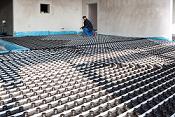
Before making a decision on a system that will affect your comfort and energy expenses for years to come, you should familiarize yourself with some of the different types of radiant systems available.
Radiant heat systems work by emanating heat from panels that are installed within your walls, floors or ceiling. The heat is then distributed through your house, until it reaches the temperature at which your thermostat is set. Because they eschew ducts as a means of distributing the air, radiant systems don't lose heat in the delivery process, making them very efficient.
There are different types of radiant heat systems that require different types of installations, but they share the same basic premise. Hydronic (or hot water) systems are the most popular types of radiant systems around, largely because they are relatively easy to install. A series of tubes is installed underneath your flooring that circulates water that has been warmed by a boiler. The flow of this water is controlled by the thermostat that sets the home's ideal temperature.
Wet installs are similar but use a series of tubes (for water systems) or cables (for electric systems) embedded in a concrete slab located in your basement or under your floors. Dry installs forgo the slab and place the cables or tubes in an empty space under your floor. This simplifies the installation process but raises the operating temperature because it has to heat more total space.
An HVAC technician can talk with you about your home’s heating needs to determine what type of system is best for you. Contact Rodenhiser Plumbing, Heating & Air Conditioning today to speak with a certified HVAC expert who can help you with all of your heating and cooling needs. We have proudly served the state of Norfolk MA for more than 80 years.
Our goal is to help educate our customers about energy and home comfort issues (specific to HVAC systems). For more information about radiant heat and other HVAC topics, download our free Home Comfort Solutions Guide.
Photo courtesy of Shutterstock.